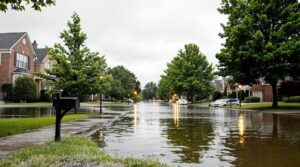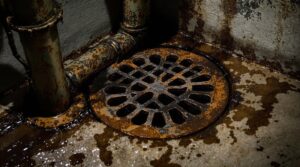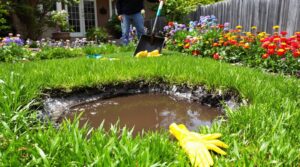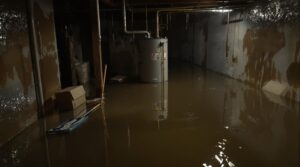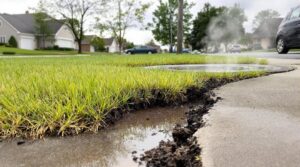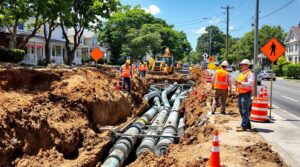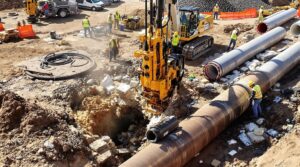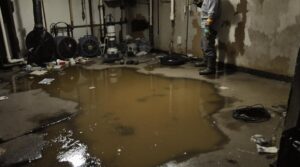Basement drain pipe replacement costs average $3,250, with total project expenses ranging from $3,000 to $15,000 depending on materials and complexity. PVC pipes cost approximately $0.60 per square foot, while premium materials like cast iron can reach $30 per linear foot. Labor rates typically range from $45 to $200 per hour, with urban areas commanding higher fees. Additional expenses include permits ($50-$500) and auxiliary repairs. Understanding the full scope of costs and material options helps property owners make informed decisions about their plumbing investments.
Key Takeaways
- Average basement drain pipe replacement costs $3,250, with total project costs potentially ranging from $3,000 to $15,000.
- PVC pipes are the most cost-effective option at $0.60 per square foot, while cast iron is priciest at $10-30 per linear foot.
- Labor costs typically range from $45-200 per hour, with urban areas commanding premium rates of $125-250 per hour.
- Additional expenses include permit fees ($50-500), drywall repair ($300-1,000), and potential emergency service charges.
- Material choice, location, accessibility, and property restoration requirements significantly impact the final replacement cost.
Understanding Basement Drain Pipe Replacement Costs
When homeowners face basement drain pipe replacement, understanding the associated costs is essential for proper budgeting and project planning. The total expense depends primarily on pipe material selection, location accessibility, and labor requirements.
A thorough cost analysis reveals that PVC pipes, starting at $0.60 per square foot, offer more economical repair solutions compared to cast iron or copper alternatives. The average basement drain replacement costs around $3,250 total.
Labor costs constitute the largest expense, ranging from $45 to $200 per hour, with rates varying by geographic location and project complexity. Accessibility greatly impacts overall costs, particularly when pipes are located beneath concrete slabs or in densely populated urban areas.
Projects requiring extensive excavation or emergency repairs typically command premium pricing. Total project costs can range from $3,000 for basic replacements to $15,000 or more for complex installations, with additional foundation repairs potentially adding $2,150 to $7,500.
Material markups by plumbers to cover overhead must also be factored into the final cost calculation.
Common Signs You Need to Replace Basement Pipes
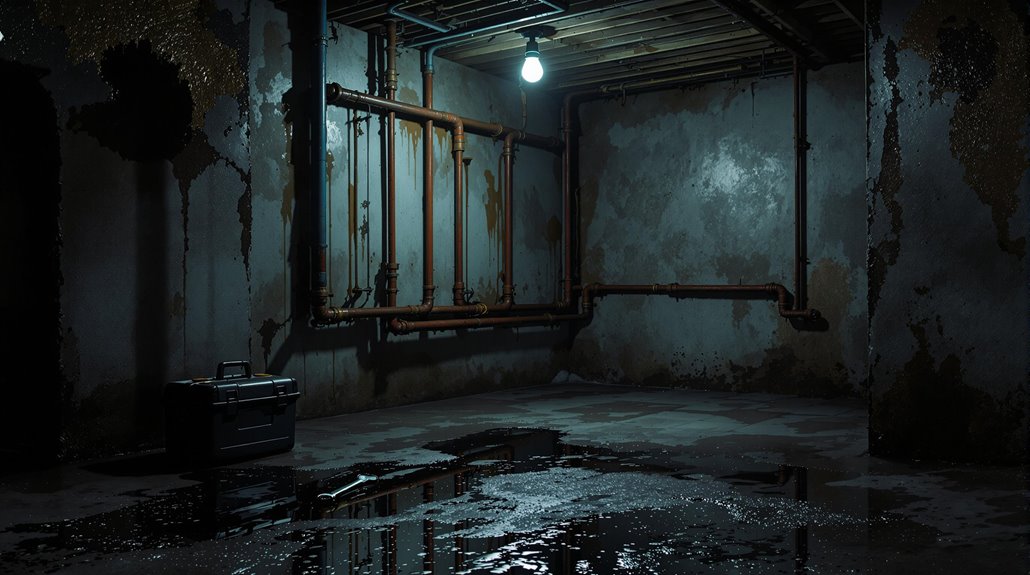
Understanding the warning signs of failing basement pipes can prevent catastrophic plumbing emergencies and expensive structural damage.
Professional pipe inspection techniques can identify these issues early, allowing homeowners to address problems before they escalate.
Several critical signs of deterioration indicate the need for immediate attention:
- Multiple slow-draining fixtures accompanied by gurgling sounds from drains, particularly when toilets flush or appliances drain.
- Persistent foul odors emanating from basement drains or recurring sewage backup in floor drains.
- Water damage on basement walls, floors, or visible moisture around pipe connections.
- Foundation cracks or unexplained dampness in the basement, often accompanied by mold growth.
In older homes with cast iron or clay pipes, these warning signs are particularly significant. When water backs up in your shower during toilet flushes, it strongly suggests a main line blockage.
The porous nature of these materials makes them susceptible to root intrusion and internal deterioration.
Regular inspection and prompt attention to these indicators can prevent extensive damage to the home's plumbing infrastructure.
Types of Pipe Materials and Their Costs
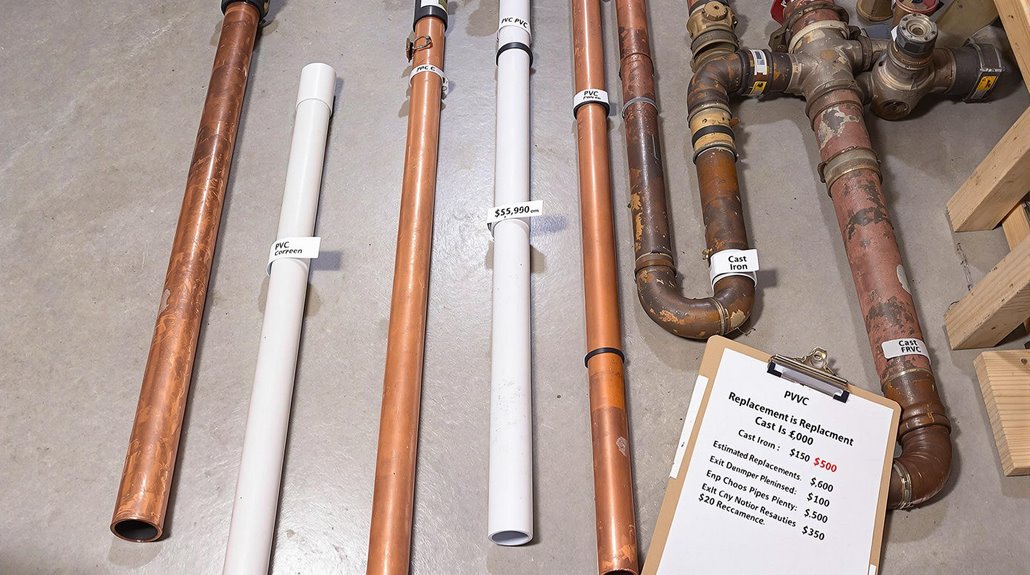
When replacing drain pipes, property owners must evaluate several material options that vary considerably in cost and performance characteristics.
PVC and polypropylene represent economical choices at $0.50-$8 and $1-$15 per linear foot respectively, while copper pipes range from $2-$15 per linear foot and offer superior corrosion resistance.
Cast iron, though expensive at $10-$30 per linear foot, provides exceptional durability with a lifespan of up to 70 years, making it a premium choice for long-term installations. A professionally installed drainage system, including proper pipe selection and placement, can last 30 to 40 years with regular maintenance.
Popular Pipe Material Options
Modern drain pipe systems offer several material options, each with distinct characteristics, durability levels, and cost considerations.
When evaluating pipe material comparisons for basement installations, property owners should carefully assess durability, cost-effectiveness, and installation considerations specific to their project requirements.
Common material options include:
- Polyethylene: Flexible, eco-friendly solution ranging from $0.50-$3.00 per linear foot, ideal for tight spaces
- PVC: Durable with excellent pressure resistance, expected to last 100 years underground
- Galvanized Steel: Zinc-coated for enhanced durability, priced between $2.00-$8.00 per linear foot
- Copper: Premium option at $5.00-$15.00 per linear foot, offering superior heat resistance
Each material presents unique advantages regarding longevity, chemical resistance, and structural integrity, making material selection essential for successful drain pipe replacement projects.
Cost Comparison By Material
The selection of pipe materials markedly influences overall project costs, with options ranging from economical PVC to premium cast iron solutions. PVC represents the most cost-effective choice at $0.60-$7.50 per linear foot after markup, while cast iron commands $12.50-$30 per linear foot, reflecting its superior material durability and noise reduction properties.
For a typical 30-foot installation, costs vary greatly: PVC installations range from $19-$225, while cast iron systems can reach $375-$900. Copper and polypropylene offer middle-range alternatives at $75-$450 and $37.50-$450 respectively, with varying environmental impact considerations. Galvanized piping falls between these options at $112.50-$360 per 30 feet.
Beyond material expenses, labor costs from licensed plumbers ($45-$200 hourly) and potential structural modifications can substantially affect total project expenditure.
Labor Expenses and Professional Services
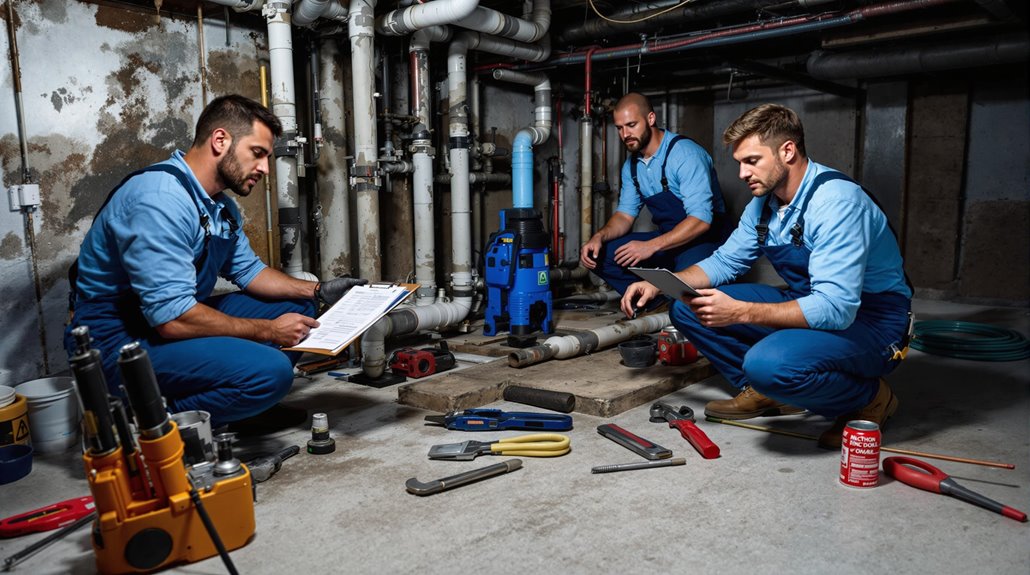
Professional plumbing labor rates vary substantially by region, with urban areas typically commanding $125-200 per hour while rural zones average $45-100 per hour for licensed technicians.
Complex drain pipe replacements involving multiple line breaks, specialized equipment, or difficult access points can increase labor expenses by 50-100% over standard installations.
Emergency service calls often incur premium surcharges of 1.5 to 2 times the standard rate, particularly for after-hours work or immediate response requirements.
Hourly Rates By Region
Varying considerably across different regions of the country, plumbing labor rates for drain pipe replacement typically range from $45 to $200 per hour for licensed professionals, with urban areas commanding premium rates up to $250 per hour.
Regional labor costs reflect local market conditions, service availability, and cost of living factors.
Key considerations for regional rate variations include:
- Metropolitan areas typically charge 30-50% higher rates due to increased operational costs
- Emergency services in urban zones can exceed $300 per hour
- Rural areas generally maintain lower base rates but may add travel charges
- Specialized expertise for complex installations commands premium rates regardless of location
Additional factors affecting regional pricing include permit requirements, local building codes, and the availability of qualified contractors in the service area.
Complex Project Labor Costs
Complex drain pipe replacement projects demand substantial labor investments, with costs typically ranging from $800 to $8,000+ depending on project scope and challenges.
Professional labor rates vary between $45 and $200 per hour, reflecting the significant labor variability inherent in these undertakings.
Project complexity directly impacts labor expenses through multiple factors, including pipe accessibility, excavation requirements, and the need for specialized equipment.
Underground pipe access, particularly beneath concrete foundations, requires additional expertise and resources.
Projects involving multiple fixtures or extensive repiping demand more time and skilled labor.
Essential permit fees ($50-$500) and potential auxiliary services, such as drywall repair ($300-$1,000), contribute to overall costs.
Multi-day projects requiring specialized services like mold remediation or foundation repairs further escalate labor expenses.
Emergency Service Surcharges
Emergency plumbing scenarios often necessitate immediate service outside regular business hours, leading to substantial surcharges on labor costs.
Service pricing varies markedly based on timing and urgency, with rates typically doubling during weekends and tripling during holidays compared to standard business hours.
- Evening emergency plumbing services incur additional fees of $100-$200 above regular rates
- Weekend service calls command $300-$600 per hour
- Holiday rates escalate to approximately $450 per hour or higher
- Specialized emergency services like drain unclogging range from $300-$800
The final cost depends on multiple factors, including the complexity of the repair, accessibility of the affected area, and required materials.
Professional plumbers maintain specific pricing structures for emergency calls, often implementing flat-rate fees for common issues while applying hourly rates for more complex situations requiring extensive labor.
Additional Repair Considerations
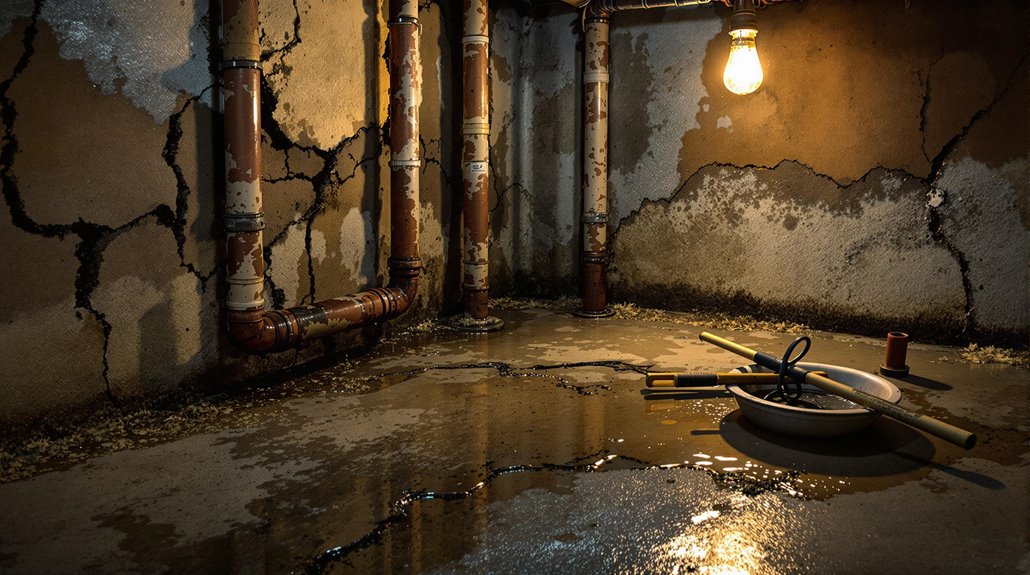
When replacing drain pipes, homeowners must account for numerous consequential repairs that extend beyond the primary plumbing work. Cost estimation must include structural repairs, surface restoration, and preventive maintenance measures to guarantee thorough project planning.
| Repair Category | Cost Range | Priority Level |
|---|---|---|
| Foundation Work | $3,000-$8,000 | Critical |
| Surface Repairs | $2-$20/sq ft | High |
| Interior Finishes | $4-$10/linear ft | Medium |
| Waterproofing | $4,500-$15,000 | High |
| Health Safety | $1,500-$6,000 | Critical |
The repair process often requires addressing multiple layers of damage, starting from the foundation and working up through flooring, walls, and trim. Extensive repairs may include foundation excavation, crack repairs, waterproofing systems, and drainage improvements. Surface-level restoration typically encompasses replacing damaged flooring, repairing drywall, and refinishing interior trim. Health considerations, particularly mold remediation and sewage cleanup, must be factored into the overall project scope to guarantee safe living conditions. Homeowners should review their personal liability coverage to ensure protection against potential water damage claims from neighboring properties.
Factors That Impact Overall Project Cost
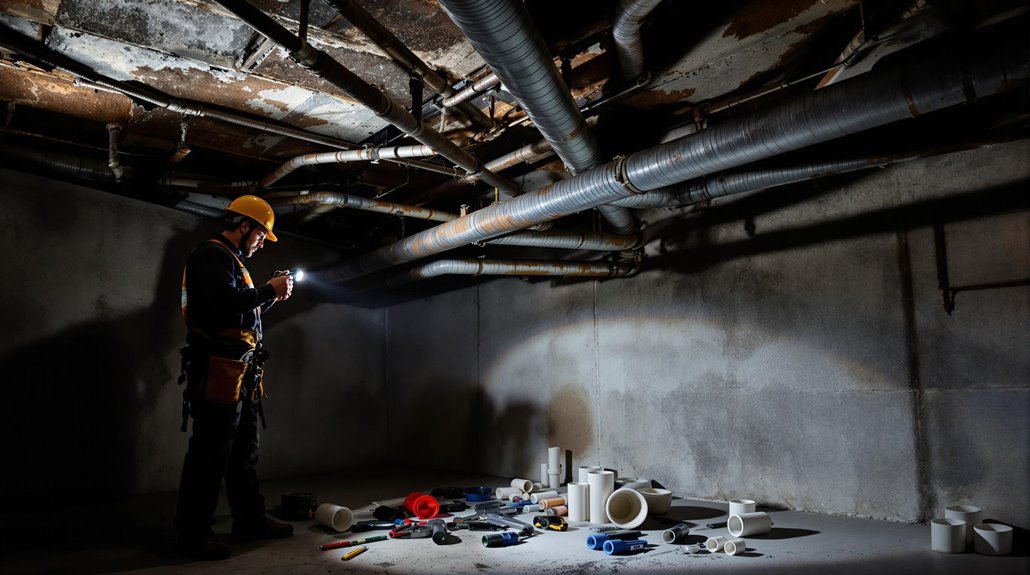
The total expense of drain pipe replacement hinges on multiple interconnected variables that notably influence project costs.
Material selection plays a fundamental role, with options ranging from economical PVC at $0.50-$8 per linear foot to premium cast iron at $10-$30 per linear foot. Geographic location and accessibility markedly impact labor costs, with urban areas typically commanding higher rates and complex access points extending project timelines.
- Location specifics (basement, under-concrete) can increase complexity and cost
- Depth and accessibility of existing pipes affect labor requirements
- Property restoration needs (yard repair, water damage) add supplementary expenses
- Permit requirements and inspection fees vary by municipality
The method of repair chosen and the extent of necessary excavation directly correlate with overall expenses.
Professional plumbers typically include a 20-40% markup to cover overhead costs, while quality material selection, though initially more expensive, can reduce long-term replacement frequency and associated costs.
Cost-Saving Tips and Best Practices

Understanding cost-saving strategies can markedly reduce drain pipe replacement expenses while maintaining quality results. Implementing trenchless methods offers a cost effective solution, minimizing both labor costs and property disruption while delivering superior outcomes. This technique typically completes projects in hours rather than days, greatly reducing overall expenses.
Regular plumbing maintenance serves as an important preventive measure, helping identify potential issues before they escalate into costly repairs. Utilizing eco-friendly solutions for minor clogs and installing drain screens can prevent more serious problems.
Homeowners should also explore insurance options and protection plans that may cover unexpected repairs or replacements. Additionally, comparing quotes from multiple qualified technicians guarantees competitive pricing, while selecting appropriate materials like PVC can further reduce costs.
Professional maintenance contracts often prove more economical than emergency services, and proper drain care practices help extend the system's lifespan while minimizing the need for extensive repairs.
The Benefits Of Consulting A Public Adjuster
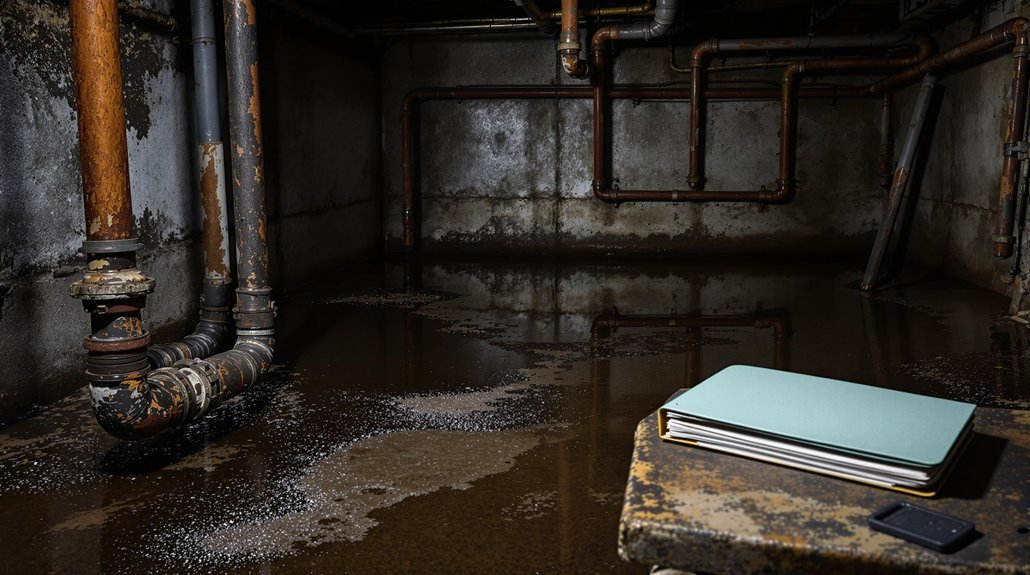
When dealing with major drain pipe replacement claims, consulting a public adjuster can provide invaluable expertise in guiding through insurance policies and maximizing claim settlements.
Public adjusters conduct thorough damage assessments, identifying both visible and hidden issues that could impact the full scope of pipe replacement costs.
Their professional representation streamlines the claims process while typically securing higher payouts compared to policyholder-managed claims, particularly in complex cases involving multiple damage points throughout a plumbing system.
Studies show policyholders working with public adjusters' expertise can receive settlement increases of up to 500% for non-catastrophic claims like plumbing issues.
Expertise In Insurance Claims
Managing complex insurance claims for drain pipe replacement requires specialized expertise that public adjusters can provide. These licensed professionals understand intricate claim processes and maintain current knowledge of local regulations affecting insurance settlements. Their expertise helps maximize claim values while guaranteeing compliance with policy terms and documentation requirements.
Key advantages of public adjuster expertise include:
- Extensive damage assessment capabilities for accurate claim documentation
- Strategic insurance claim strategies tailored to specific policy coverage
- Professional negotiation skills to secure ideal settlement values
- In-depth understanding of construction costs and repair methodologies
When selecting an adjuster, verify state licensing, review professional credentials, and evaluate their experience with plumbing-related claims.
Professional adjusters help identify overlooked damages and guarantee all legitimate expenses are included in the settlement, protecting the policyholder's interests throughout the claims process.
With settlement rates typically ranging from 5% to 15%, public adjusters often secure significantly higher compensation that outweighs their fees.
Objective Damage Assessment
Professional damage assessment by public adjusters delivers essential objectivity and thoroughness to insurance claims for drain pipe replacement.
Their extensive approach utilizes specialized equipment like moisture meters and infrared cameras to detect hidden damages that might otherwise go unnoticed, particularly in basement plumbing systems.
Through objective inspection methods, public adjusters document all aspects of drain pipe damage, including water infiltration patterns, structural impacts, and potential secondary issues affecting the basement's integrity.
Their technical expertise enables the identification of both visible deterioration and concealed problems that could lead to future complications.
This detailed documentation serves as vital evidence during claims negotiations, helping to guarantee proper compensation for all necessary repairs and preventing insurance companies from undervaluing the extent of required replacements.
Since public adjuster fees typically range up to 10% of the total claim settlement, their thorough assessment services often lead to significantly higher payouts that more than offset their cost.
Streamlined Claim Process
Engaging a public adjuster greatly streamlines the complex drain pipe replacement claims process, offering policyholders thorough support and expert guidance throughout each phase.
These licensed professionals excel in policy interpretation and claim negotiation, guaranteeing maximum compensation while reducing stress for property owners.
- Conducts extensive property damage assessments and detailed documentation of all affected drain pipe systems
- Manages all communication with insurance carriers, contractors, and relevant parties to expedite claim resolution
- Utilizes industry expertise to identify coverage opportunities that might otherwise be overlooked
- Secures compliance with policy requirements and regulations while advocating for fair settlement values
Their systematic approach transforms a potentially overwhelming experience into an organized, efficient process.
Public adjusters' professional representation proves invaluable in steering technical aspects of drainage system claims while maintaining focus on ideal outcomes for policyholders.
With contingency fee rates typically ranging from 5-20% of the final settlement, public adjusters often provide more cost-effective representation compared to legal alternatives.
Higher Claim Payouts & Settlements
While homeowners may attempt to handle drain pipe replacement claims independently, statistical evidence demonstrates that consulting a public adjuster leads to noticeably higher settlements – up to 747% more than self-managed claims.
Public adjusters achieve these higher claims through extensive damage assessments, expert policy interpretation, and skilled settlement negotiations with insurance companies.
Working on a contingency fee basis, public adjusters meticulously document all damages, including often-overlooked issues that can greatly impact claim value.
Their industry expertise enables emotion-free negotiations focused on maximizing settlements while ensuring proper coverage for repair costs.
About The Public Claims Adjusters Network (PCAN)

As a leading organization in the insurance claims industry, the Public Claims Adjusters Network (PCAN) represents a nationwide coalition of licensed public adjusters dedicated to protecting policyholders' interests during insurance claims.
PCAN members leverage their expertise in the claims process to guarantee fair settlements for property damage, including drain pipe replacements and associated water damage.
The network's all-encompassing approach includes:
- Thorough policy review and damage assessment using advanced documentation methods
- Expert negotiation with insurance companies to maximize claim settlements
- Emergency response services to prevent further property damage
- Continuous support and communication throughout the entire claims process
PCAN adjusters work on a contingency basis, charging a percentage of the final settlement rather than upfront fees.
Their specialized knowledge of insurance policies and industry standards enables them to identify often-overlooked damages and secure appropriate compensation for policyholders facing drain pipe replacement and related structural issues.
Frequently Asked Questions
How Long Does a Typical Basement Drain Pipe Replacement Project Take?
Basement plumbing replacement timeline typically ranges from 3-7 days, depending on project scope, existing infrastructure conditions, and whether professional contractors utilize specialized equipment during the replacement process.
Can I Stay in My Home During Basement Pipe Replacement?
While noise concerns exist, occupancy during basement pipe replacement depends on project scope. Most extensive replacements require temporary accommodations due to plumbing interruptions and safety considerations during construction activities.
What Permits Are Required for Basement Drain Pipe Replacement?
Basement drain pipe replacements require plumbing permits issued by local authorities, adhering to building codes and installation guidelines. Licensed master plumbers must obtain proper documentation before commencing any sewer or drain modifications.
Are Basement Drain Pipe Replacements Covered by Homeowner's Insurance?
Standard insurance policies typically cover basement drain pipe replacements only if damage is sudden and accidental, not due to wear. Coverage limits and specific terms vary among insurers.
How Often Should Basement Drain Pipes Be Inspected for Potential Issues?
An ounce of prevention is worth a pound of cure. Professional inspection frequency varies: newer pipes need checks every 2-3 years, while older systems require annual inspections to prevent potential damage and guarantee safety.
References
- https://www.homeadvisor.com/cost/plumbing/repair-a-drain-line-breakage/
- https://superbrothers.com/blog/sewer-line-replacement-cost-factors-key-influencers/
- https://www.usstn.com/blog/diy-vs-professional-basement-repairs
- https://blog.propllr.com/how-to-do-content-research-for-blog-posts
- https://www.angi.com/articles/cost-to-replace-drain-pipes-in-house.htm
- https://www.rangeline.com/5-factors-that-can-affect-sewer-line-repair-costs/
- https://www.angi.com/articles/how-much-does-installing-or-replacing-plumbing-pipes-cost.htm
- https://modernize.com/plumbing/drain-repair-replace-cost
- https://bellbroshvac.com/blog/cost-replace-sewer-line-basement-expert-advice-homeowners/
- https://www.blackforestplumbing.com/b/signs-your-main-drain-line-needs-to-be-replaced
